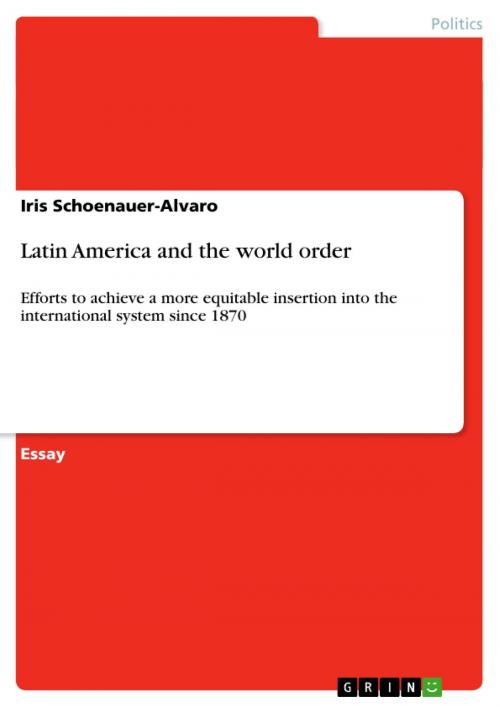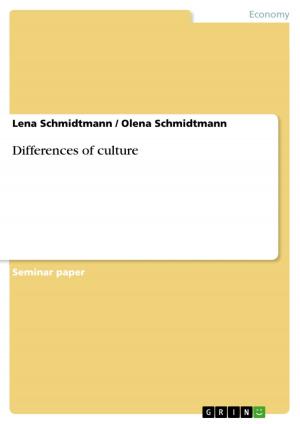Latin America and the world order
Efforts to achieve a more equitable insertion into the international system since 1870
Nonfiction, Social & Cultural Studies, Political Science, International, International Relations| Author: | Iris Schoenauer-Alvaro | ISBN: | 9783640124541 |
| Publisher: | GRIN Publishing | Publication: | July 31, 2008 |
| Imprint: | GRIN Publishing | Language: | English |
| Author: | Iris Schoenauer-Alvaro |
| ISBN: | 9783640124541 |
| Publisher: | GRIN Publishing |
| Publication: | July 31, 2008 |
| Imprint: | GRIN Publishing |
| Language: | English |
Essay from the year 2003 in the subject Politics - International Politics - Region: Middle- and South America, grade: Honours, Dublin City University, 28 entries in the bibliography, language: English, abstract: More than 510 years after the conquest of Latin America, critical opinions are still voiced with regard to the quality of the subcontinent's insertion into the international system: 'When one begins to see the multiple business connections and interests, it is difficult to avoid concluding that the Plan Puebla Panama (PPP) is more about energy and resource extraction than it is about development'. Arguments along the lines of this PPP critique have been frequently mentioned when discussing topics such as declining terms of trade for raw materials, the unequal access to the world markets, exploitative practices of labour-intense industries, socially detrimental impositions of structural adjustment measures, the increasing hegemony of the United States (US) over Latin America through new free-trade arrangements or projects such as Plan Colombia, and many more. The purpose of this paper is to look beyond plain accusations by assessing the international arena Latin America found itself in since 1870 as well as the efforts made by Latin America to achieve a more equitable insertion into it. Taking into consideration the complexity of the topic, I will only broadly outline earlier attempts while focussing on efforts taken after the Great Depression of 1929. The essay will be organised in four main sections covering the three major phases plus a conclusions section: Primary commodity exports (PCE), import substitution industrialisation (ISI), neo-liberalism (NL), and the conclusions section which will also cover Latin America's prospects. The important aspect of regionalism will be split into 'old regionalism', which will be covered in the ISI section, and 'new regionalism', which falls into the phase of neo-liberalism.
Essay from the year 2003 in the subject Politics - International Politics - Region: Middle- and South America, grade: Honours, Dublin City University, 28 entries in the bibliography, language: English, abstract: More than 510 years after the conquest of Latin America, critical opinions are still voiced with regard to the quality of the subcontinent's insertion into the international system: 'When one begins to see the multiple business connections and interests, it is difficult to avoid concluding that the Plan Puebla Panama (PPP) is more about energy and resource extraction than it is about development'. Arguments along the lines of this PPP critique have been frequently mentioned when discussing topics such as declining terms of trade for raw materials, the unequal access to the world markets, exploitative practices of labour-intense industries, socially detrimental impositions of structural adjustment measures, the increasing hegemony of the United States (US) over Latin America through new free-trade arrangements or projects such as Plan Colombia, and many more. The purpose of this paper is to look beyond plain accusations by assessing the international arena Latin America found itself in since 1870 as well as the efforts made by Latin America to achieve a more equitable insertion into it. Taking into consideration the complexity of the topic, I will only broadly outline earlier attempts while focussing on efforts taken after the Great Depression of 1929. The essay will be organised in four main sections covering the three major phases plus a conclusions section: Primary commodity exports (PCE), import substitution industrialisation (ISI), neo-liberalism (NL), and the conclusions section which will also cover Latin America's prospects. The important aspect of regionalism will be split into 'old regionalism', which will be covered in the ISI section, and 'new regionalism', which falls into the phase of neo-liberalism.















